



Yet, despite his achievements, Brunel was often faced with
disappointment and his early death could be partly attributed to the stress of taking on such huge commitments. He serves as an example of both the advantages and dangers of brilliant, driven people taking full responsibility for every phase of their projects. A closer examination of his work also reveals the hidden costs of such fierce ambition in the lives of workers killed on the job and the financial ruin of some of his backers. The detrimental side effects of the Industrial Revolution have been well documented.
Brunel’s significance today is two fold. First, there is his lasting
engineering legacy, visible in the bridges, tunnels, viaducts, buildings and rail routes he left behind. Second, is the example he has set for the engineers and innovators who followed him and who are inspired to translate their creative thought into action.
Brunel 200 looked to celebrate those who followed in Brunel's footsteps and to inspire the Brunels of the future.
